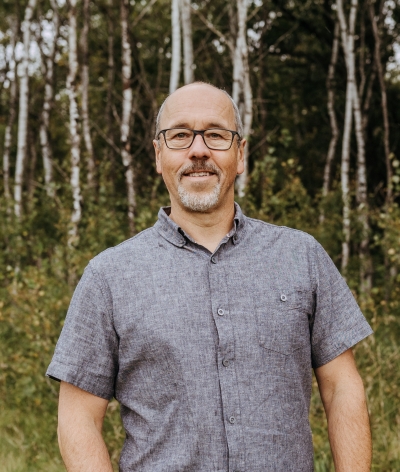Winnipeg prof David Balzer's new audio documentary reflects on how Canadians use the phrase, "Oh my God."
When was the last time you said, “Oh my God?”
For the last 18 years, Winnipeg media professor David Balzer has been researching that simple question. Now he has released a documentary called Oh My God: The Audio Doc.
It all began nearly two decades ago as Balzer was hosting a live talk show event at the University of Manitoba. He had the idea of posing that question to students on campus.
 Balzer was no stranger to interviewing people, which he frequently did when he had cohosted the radio show GodTalk. But something was different in the responses he received.
Balzer was no stranger to interviewing people, which he frequently did when he had cohosted the radio show GodTalk. But something was different in the responses he received.
“People were so intrigued. So, when I started working at CMU afterwards, I decided I wasn’t done with it yet,” says Balzer. “That was sort of the birthplace of the project, and then it trickled into something a lot bigger.” CMU is Canadian Mennonite University, where Balzer is associate professor of communications and media.
In 2017, after years of research, interviews and collecting content, Balzer resolved to produce an audio documentary.
“The phrase is not owned by Christians. It's owned by the culture,” Balzer says. So, a large component of his research was interviewing folks on the street. “I would go out for a weekend and map out a part of the city. Then I would start walking up to people with my microphone and ask them if they would give me a couple minutes.”
Even going as far as to interview a bride and groom on their wedding day, Balzer came across many different responses and perspectives during his interviews. He spoke with those who classified themselves as religious and with others who didn’t have any religious affiliation at all.
“I feel guilty almost every time I use it,” said one interviewee in the audio documentary.
Another claimed, “I say it a lot actually.”
There was one response that stuck out clearer than others, and that was one woman who claimed to use the phrase all the time, yet she hoped it would never slip out of her mouth if she was in a church setting.
“That started getting me really curious about the complexity in this phrase,” Balzer says. “What I discovered was a kind of social negotiating of care around language use. In this little phrase, we’re actually negotiating how we’re going to live together.”
Balzer also conversed with experts from various fields.
Melissa Mohr, a PhD who’s written a book on the history of swearing, was able to walk him through how the phrase was used in the Middle Ages.
Sali Tagliamonte, professor of linguistics at the University of Toronto, explained to Balzer how the phrase evolved. Much of its transformation from a sacred phrase to a mundane phrase occurred after the Second World War.
Old Testament scholar Gordon Matties spoke of the phrase in relation to its use in the Psalms and the frequent association of the phrase with the Exodus 20:7 commandment to not take the Lord’s name in vain.
The finished 29-minute documentary, released in January 2025, features a range of interviews with everyday people and conversations with linguistics experts. It concludes with reflections from Balzer himself.
“People say, ‘Wow, 18 years of research, and now you’ve only got 29 minutes to show for it,’ ” Balzer reflects. “But for me, it’s never been about a final product. It’s about the richness of those conversations I’ve been able to have in super unique spaces in our country.”
 After years of research, Balzer realized this project was about more than a phrase; it was about how we connect, express ourselves and navigate a shared language. He also experienced a transformation – only a few months prior to the release of the audio documentary – in his personal response to the phrase, “Oh my God.”
After years of research, Balzer realized this project was about more than a phrase; it was about how we connect, express ourselves and navigate a shared language. He also experienced a transformation – only a few months prior to the release of the audio documentary – in his personal response to the phrase, “Oh my God.”
Previously feeling ambivalent upon hearing those three words, Balzer now asks himself, “What if I allow the phrase not to annoy me, but to actually prompt me to be more aware of God’s presence?”
Balzer’s audio documentary invites listeners to consider how a simple phrase heard every day reveals deeper layers of culture, and how it might prompt us to consider God’s presence even in moments when frustration feels most natural.
David Balzer’s “Oh My God: The Audio Doc” can be found at omgthedoc.com.
Jaidyn Bremer of Dundas, Ont., is communications assistant at Faith Today.